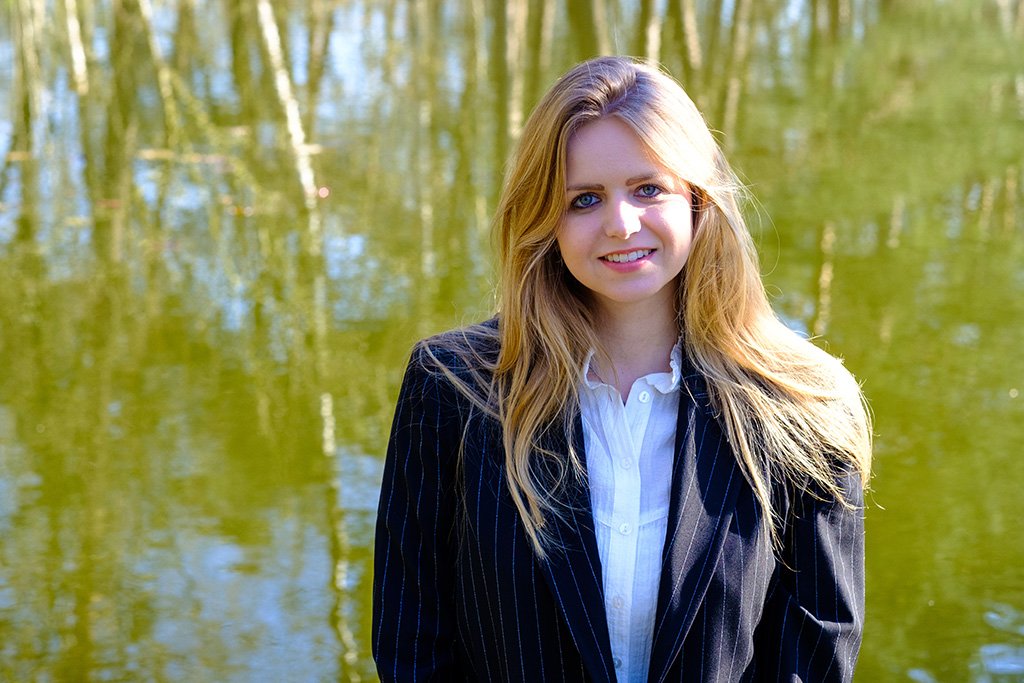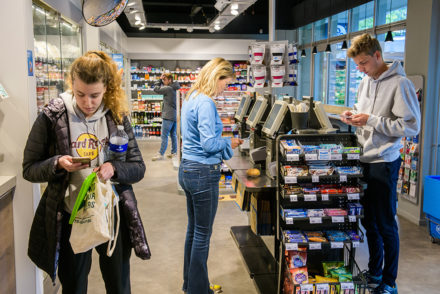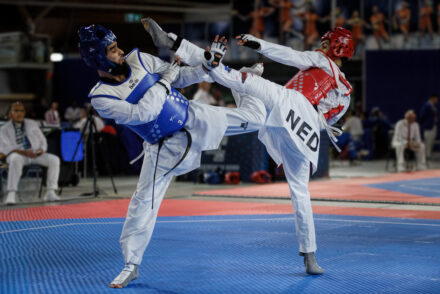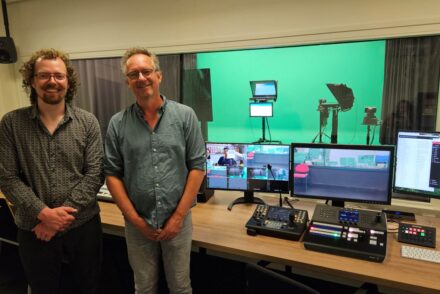Kristel Doreleijers: ‘The ambition I had for swimming, I now have for research’
Nightmares, daydreams, and unfulfilled wishes: in the category ’13 questions to’ students and scientists show themselves from a different side. This time: Kristel Doreleijers, PhD in linguistics at Tilburg University and the Meertens Institute. As one of the new Faces of Science, she will be blogging about science for young people.

1. If you were not a scientist, what would you do?
“I would probably be concerned with translating scientific insights into practice anyway. Which I am now going to do for Faces of Science (in Dutch). I find it such a shame when scientific knowledge does not reach society. I want to contribute to that by sharing insights, maybe by doing that, we can restore trust in science a bit more.
“Otherwise, I might have a clothing store, I’m very much into fashion.”
2. What are you most proud of?
“My swimming achievements. In 2011 I swam the Dutch record for 18-year-olds on the 200-meter breaststroke. And two years later, I became the Dutch champion at that distance as well. I am also proud of the Popularization Prize I received in 2019 from the LOT the Netherland Graduate School of Linguistics. But especially with the swimming achievements, that laid the foundation for how I work now. Those achievements were a reward for all the hard work. The energy I put into that ambition then, I now put into my research work.”
3. Which book would you recommend to everyone?
“I don’t read a lot of literature, I mainly read professional literature. However, The Evenings by Gerard Reve really stayed with me. I would recommend it to everyone. It’s a book in which nothing really happens, that’s why it’s so remarkable that you can stay so fascinated the whole time.”
4. What is your greatest fear?
“That I have no control. I always swam fanatically in my younger years. I stopped doing that, not because I didn’t want to anymore but because of an injury. In that way, the decision was made for me. Now I am doing research with the same passion. My fear would be that I would no longer be in control, that I would no longer be able to do it because of external issues.”
5. You have an unexpected free afternoon; how do you spend the time?
“I would go into town, shopping. First stop at my favorite boutiques and then eat something at a good restaurant. With clothes, I always look at the more exclusive things. I like to look at brands. Especially Dutch and Scandinavian brands, sustainable clothing. I like to walk around a bit, see what’s new, look for combinations. I also know many people in those boutiques, so I can have a chat with them. Socializing and fashion, I like that.”
6. What do few people know about you?
“That I am really not a morning person at all. When I was still swimming, I always had to get up at five o’clock to train, but I prefer to get up at nine o’clock. I also prefer to try to meet up a little later. People think I always get up early because I have so many activities. But that’s mostly because I work such long hours. I also continue to work in bed. Not with my laptop, but I think about things then and the next day I write them all down.”
7. Who is your great role model, and why?
“I don’t really have a great role model. I can immensely enjoy beautiful sports performances or a beautiful lecture. I often reflect that back onto myself. What can I learn from that, or how can I get inspiration from that? But I’m not very good at adoring people.”
8. What gives you a short fuse?
“Poor communication. I really value making clear agreements and keeping them. It bothers me a lot when that doesn’t happen. By that I mean agreements about the content. The Brabant’s 15-minute habit, that you come a bit later, that’s fine by me.”
9. What aspect do you find difficult about your job?
“You have to have a lot of patience for this work, which is sometimes difficult. The scientific process can sometimes be incredibly slow. There are so many steps before an article is finally published. As a result, the news can already be over. That’s why I enjoy writing popular science articles because then you can react much faster. The scientific bureaucracy surrounding research with ethics reviews and peer reviews is of course very good, but I feel it can sometimes be taken a bit too far.”
10. What should you do (more of)?
“Saying no. I say yes to a lot of things. Often because I also like doing it. But the consequence is that I take too few breaks. I can lose myself completely in my work and keep going for a long time. Colleagues sometimes tell me that: are you still here? But it is also something that characterizes me, so I’m not going to stop straightaway.”
11. Netflix or sports?
“Sports. I can enjoy a good series or movie, but I still find swimming a better way to take my mind off things than Netflix. And it’s not just the doing, I also love watching sports. I watch a lot of soccer games, for example the Champions League, and at the Olympics, I also follow all the sports.”
12. Never work again or never take a vacation?
“I’m still young, so never a vacation. I get a lot of pleasure from my work. I’m also lucky that I can arrange the work a lot myself, so it doesn’t always feel like work. Besides, you have to work to be able to go on vacation.”
13. Working in the office or from home?
“I find the mix works well. Writing I prefer to do at home, but for research or lecturing, I consider being on location and face to face to be very important. Personal contact is also pleasant at conferences. Sometimes people come up to you to talk afterward. You get to know people at the drinks, or you get new ideas. That doesn’t happen at online conferences.”
Translated by Language Center, Riet Bettonviel






